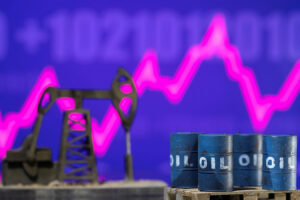THE DEPARTMENT of Energy (DoE) does not see a spike in pump prices amid concerns of a wider conflict in the Middle East after Iran’s retaliatory attack against Israel.
Energy Secretary Raphael P.M. Lotilla said that they would monitor oil prices for the week.
“While the market may initially have reacted, we hope that it will normalize,” he told reporters.
Tensions in the Middle East have escalated after Iran launched hundreds of drones and missiles at Israel late on Saturday. This was in retaliation for an alleged Israeli attack on the Iranian consulate in Syria earlier this month.
“The increasing price is brought about by the OPEC+ reduction and not necessarily related to this conflict,” Rino E. Abad, director of the Oil Industry Management Bureau, told reporters on the sidelines of an event in Taguig City.
Earlier this month, the Organization of the Petroleum Exporting Countries (OPEC) and its allies, also known as OPEC+, agreed to maintain oil output cuts until end-June.
Mr. Abad said they have seen a consistent increase in oil prices.
“It seems like there really is a shortage from a fundamental perspective of supply-demand, which is brought about primarily by the production cut, not necessarily about the conflict,” he added.
However, Mr. Abad warned that problems could arise if the conflict affects the Persian Gulf.
“The closure of the Persian Gulf would be difficult because fuel tankers won’t be able to pass through,” he said in Filipino.
The Philippines is a net importer of petroleum products. In the first half of 2023, the country imported 3.476 billion liters of crude oil, 23.7% higher than in 2022, data from the DoE showed.
Rizal Commercial Banking Corp. Chief Economist Michael L. Ricafort said there would still be volatility in global crude oil prices due to geopolitical tensions.
“Though NYMEX (New York Mercantile Exchange) crude oil prices are slightly lower today at $85 per barrel levels versus $86 a week ago, it could still lead to some pickup in prices since the Philippines is a net-importing country and imports all of its oil requirements,” he said in a Viber message.
Gerry C. Arances, executive director of think tank Center for Energy, Ecology and Development, said that the administration of President Ferdinand R. Marcos, Jr. should prepare and implement subsidies to the most vulnerable sectors in case of a spike in oil prices.
“If regional tensions worsen and Hormuz becomes a trigger point, the worldwide oil and gas supply will contract and countries will compete with each other for the available supply,” he said in a Viber message.
“The Israel-Iran conflict, like other geopolitical conflicts in the past few years, should serve as a wake-up call for the Philippine government to raise its ambition and accelerate the transition to renewable energy,” Mr. Arances added.
The Development Budget Coordination Committee (DBCC) earlier this month kept the assumptions for Dubai crude oil price at $70 to $90 per barrel for this year and $65 to $85 per barrel for 2025 to 2028. “This reflects the latest futures prices and forecasts that suggest tempered global crude oil prices over the medium term,” the DBCC said.
In separate advisories on Monday, oil companies said pump prices would increase by P0.40 per liter of gasoline, P0.95 per liter of diesel and P0.85 per liter of kerosene, effective on Tuesday (April 16).
This marks the fifth straight week that prices of gasoline have increased, and the second consecutive week of price hikes for diesel and kerosene.
This would bring the total adjustment of gasoline this year to a net increase of P9.70 per liter, diesel at P7 per liter, and kerosene at P2.25 per liter.
POTENTIAL IMPACTMeanwhile, the British Chamber of Commerce Philippines (BCCP) and the UK Department for Business and Trade acknowledged the heightened tensions in the Middle East, calling for restraint by leaders.
In a statement sent on Monday, BCCP Executive Director Chris Nelson said the growing tension in the Middle East could potentially impact oil prices, interest rates, and the stock market. These could also lead to another spike in inflation and disruption in supply chains.
“We all hope for restraint and what we can try to do is how we can assist the Philippines with supply opportunities. I would just reiterate that inflation is a key concern in many countries. I would say that the UK is working hard with the Philippines on the supply chain,” Mr. Nelson said.
The Bangko Sentral ng Pilipinas (BSP) sees inflation averaging 3.8% this year and 3.2% next year. It kept the key policy rate steady at 6.5% for a fourth straight meeting.
Mr. Nelson said that the UK could help in terms of securing the supply of meat, particularly pork, in the Philippines,
“We would once again say that we would like to see the complete implementation of Executive Order (EO) 50 and no alteration of approach on the minimum access volume which could reduce supply and potentially have an impact on inflation,” he said.
Last December, President Ferdinand R. Marcos, Jr. signed EO 50 which extended the lower tariffs on pork, corn, and rice for another year.
Meanwhile, UK Department for Business and Trade Philippine Country Director James Thackery highlighted the UK’s expertise in clean energy and infrastructure.
He said that the recent trilateral partnership among the US, Japan, and the Philippines presents an opportunity “to deepen (the UK’s) partnership with the Philippines.”
He added that the UK is interested in establishing a Joint Economic and Trade Committee in the Philippines and the Comprehensive and Progressive Agreement for Trans-Pacific Partnership. — Sheldeen Joy Talavera and Justine Irish D. Tabile
